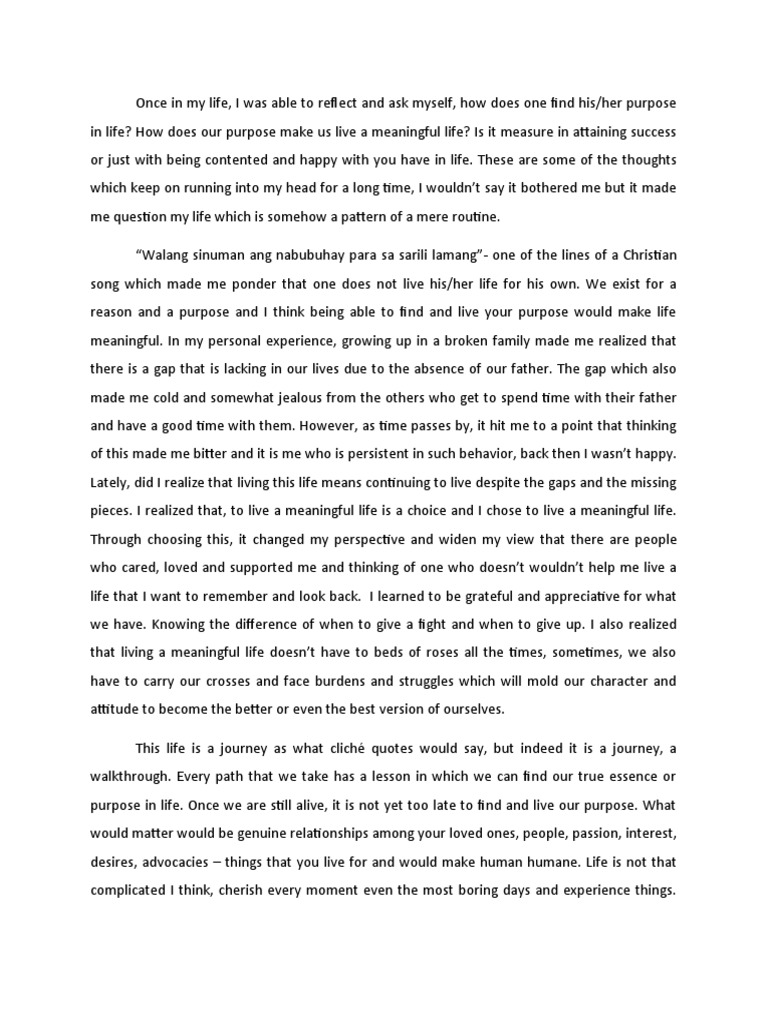The concept of a meaningful life is intricately woven into the fabric of the Bahá’í teachings, offering an expansive vista for introspection and personal development. At its core, this philosophy exhorts individuals to embark on a journey of self-discovery, shaping a life imbued with purpose and service to humanity. As one navigates through the myriad complexities of existence, the binding thread remains the pursuit of a life that resonates with vibrancy and authenticity.
Bahá’í teachings emphasize the importance of recognizing the innate potential within every individual. This perspective resembles an artist gazing at a blank canvas, contemplating the myriad of colors and palettes required to bring art to life. Just as the artist must coax beauty from chaos, human beings are encouraged to unveil their unique capacities and contributions, transforming the world around them.
One fundamental tenet in Bahá’í belief is the principle of unity. The notion that humanity constitutes a single family serves as the cornerstone of establishing meaningful relationships. This unity transcends superficial distinctions such as race, class, and religion, framing humanity as a tapestry woven together by diverse threads. By acknowledging our interconnectedness, individuals can embark on collective pursuits that generate greater impact, akin to a symphony where each instrument plays a vital role in creating harmonious melodies.
Furthermore, the teachings embody a deep-seated commitment to justice and equity. The preservation of human dignity leads to a life where service to others becomes paramount. Bahá’í philosophy posits that true fulfillment arises not from the acquisition of material wealth or societal accolades but rather from the dedication to alleviating the sufferings of others. This altruistic mindset reflects the evolution of an individual’s character; like a river that nourishes the land it traverses, individuals who engage in acts of service cultivate environments rich in compassion and mutual support.
Additionally, Bahá’í teachings advocate for lifelong learning and personal development. The pursuit of knowledge is heralded not only as a means to intellectual enhancement but also as a vital instrument for spiritual growth. Each piece of knowledge acquired can be envisioned as a stepping stone on the path toward enlightenment; the traveler learning to navigate life’s terrain with wisdom and insight. Whether formal or informal, education is a priceless treasure, unlocking deeper understandings of both the self and the universe.
In the quest for a meaningful life, the concepts of moderation and balance are paramount as well. The teachings warn against excess and extreme behaviors, urging individuals to cultivate a harmonious existence. This equilibrium is not merely a practical guideline but a philosophical approach towards sustainability and well-being. Picture a finely tuned instrument, where each note is carefully balanced, creating a sound that resonates beautifully. In a similar way, individuals who master the art of balance in their lives amplify their capacity for joy and fulfillment.
Moreover, Bahá’í teachings encourage individuals to reflect on the impermanence of life, a realization that imbues existence with urgency and significance. Just as a vibrant flower blooms yet knows its petals will eventually fall, humans are reminded of their fleeting nature, which can inspire a profound appreciation for each moment. Embracing this perspective can invigorate the pursuit of meaningful living, leading one to prioritize what truly matters—relationships, experiences, and contributions to the common good.
The Bahá’í view of the afterlife also plays a crucial role in shaping a meaningful life. According to these teachings, the soul’s journey continues beyond physical existence, igniting an inherent impetus to engage in pursuits that elevate one’s spiritual essence. This belief infuses daily actions with profound significance, as individuals strive towards lofty ideals, ever cognizant of their potential to influence the world not just in the here and now but also across the spectrum of eternity.
Community engagement emerges as a pivotal component in the fabric of meaningful living within the Bahá’í framework. By actively participating in community initiatives, individuals forge connections that transcend personal experience, cultivating a sense of belonging and shared aspiration. This collective spirit allows for the flourishing of diverse talents and perspectives, reminiscent of a thriving garden where each plant contributes to the beauty of the whole. In such spaces of collaboration, individual and communal growth occur symbiotically, manifesting the essence of unity in diversity.
At the heart of Bahá’í teachings lies a potent call to action: the embodiment of virtues. The cultivation of qualities such as kindness, humility, and integrity serves as both the compass and the guide in the intricate journey towards a meaningful life. Virtues permeate interpersonal dynamics, infusing interactions with authenticity and sincerity. These guiding principles are akin to the silent notes of a melody, shaping the symphony of one’s life journey, touching hearts and inspiring transformation.
In summation, the Bahá’í teachings provide a multidimensional perspective on living a profound and meaningful life. With its emphasis on unity, service, justice, learning, balance, appreciation of impermanence, community engagement, and virtuous living, this philosophy illuminates pathways toward enlightened existence. Each individual, like a unique thread in an intricate tapestry, has the opportunity to contribute to the collective beauty of humanity, weaving their life experiences into the greater story of existence. Such a life transcends mere existence, blossoming into a legacy of purpose and promise, a testament to the transformative power of love and compassionate action in a world yearning for harmony.
